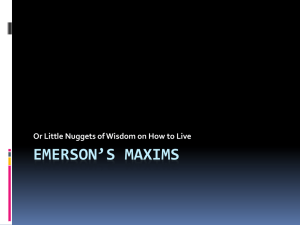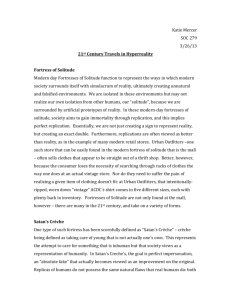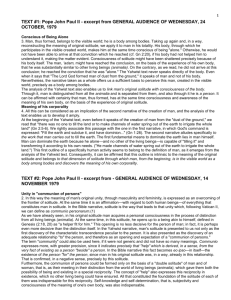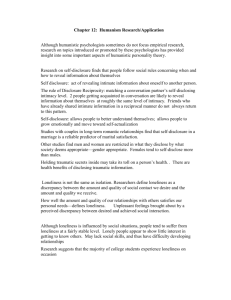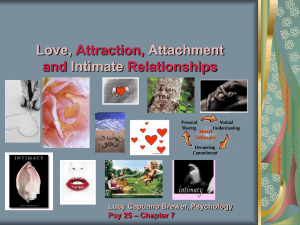THE SOLITUDE OF WRITERS
advertisement
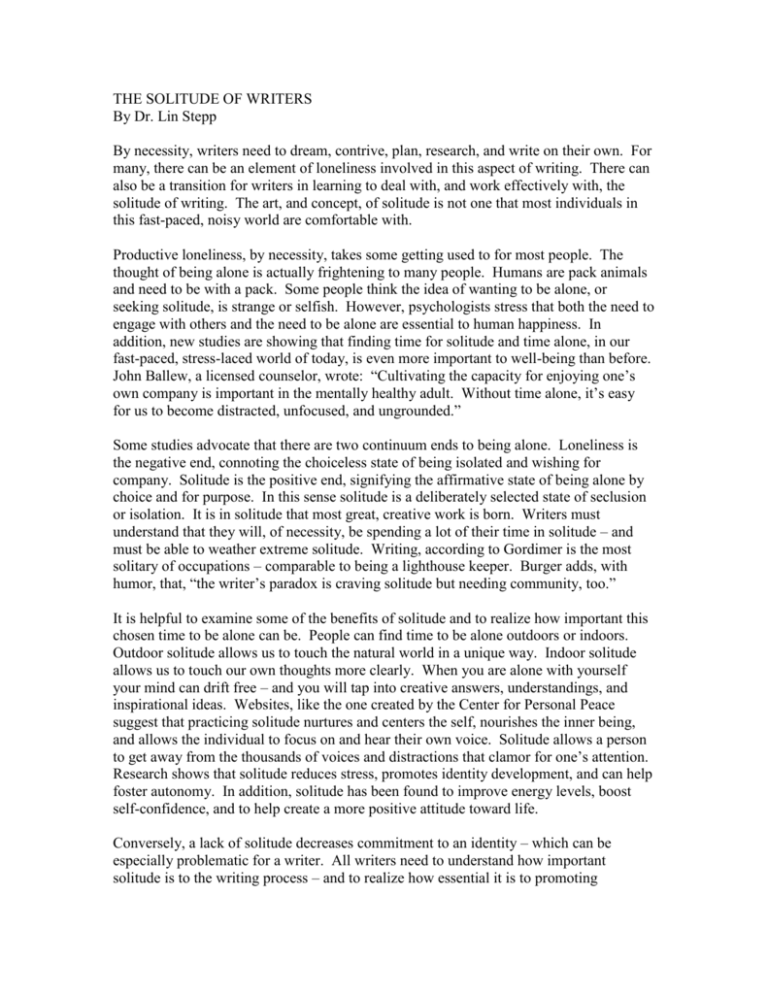
THE SOLITUDE OF WRITERS By Dr. Lin Stepp By necessity, writers need to dream, contrive, plan, research, and write on their own. For many, there can be an element of loneliness involved in this aspect of writing. There can also be a transition for writers in learning to deal with, and work effectively with, the solitude of writing. The art, and concept, of solitude is not one that most individuals in this fast-paced, noisy world are comfortable with. Productive loneliness, by necessity, takes some getting used to for most people. The thought of being alone is actually frightening to many people. Humans are pack animals and need to be with a pack. Some people think the idea of wanting to be alone, or seeking solitude, is strange or selfish. However, psychologists stress that both the need to engage with others and the need to be alone are essential to human happiness. In addition, new studies are showing that finding time for solitude and time alone, in our fast-paced, stress-laced world of today, is even more important to well-being than before. John Ballew, a licensed counselor, wrote: “Cultivating the capacity for enjoying one’s own company is important in the mentally healthy adult. Without time alone, it’s easy for us to become distracted, unfocused, and ungrounded.” Some studies advocate that there are two continuum ends to being alone. Loneliness is the negative end, connoting the choiceless state of being isolated and wishing for company. Solitude is the positive end, signifying the affirmative state of being alone by choice and for purpose. In this sense solitude is a deliberately selected state of seclusion or isolation. It is in solitude that most great, creative work is born. Writers must understand that they will, of necessity, be spending a lot of their time in solitude – and must be able to weather extreme solitude. Writing, according to Gordimer is the most solitary of occupations – comparable to being a lighthouse keeper. Burger adds, with humor, that, “the writer’s paradox is craving solitude but needing community, too.” It is helpful to examine some of the benefits of solitude and to realize how important this chosen time to be alone can be. People can find time to be alone outdoors or indoors. Outdoor solitude allows us to touch the natural world in a unique way. Indoor solitude allows us to touch our own thoughts more clearly. When you are alone with yourself your mind can drift free – and you will tap into creative answers, understandings, and inspirational ideas. Websites, like the one created by the Center for Personal Peace suggest that practicing solitude nurtures and centers the self, nourishes the inner being, and allows the individual to focus on and hear their own voice. Solitude allows a person to get away from the thousands of voices and distractions that clamor for one’s attention. Research shows that solitude reduces stress, promotes identity development, and can help foster autonomy. In addition, solitude has been found to improve energy levels, boost self-confidence, and to help create a more positive attitude toward life. Conversely, a lack of solitude decreases commitment to an identity – which can be especially problematic for a writer. All writers need to understand how important solitude is to the writing process – and to realize how essential it is to promoting contemplation and creativity. Creativity is a major byproduct of solitude. Author Lionel Fisher explained that withdrawing into solitude moves an individual into a low arousal state that fuels creative inspiration. The outer world has so much arousal, distraction, and clamor that it drains the creative battery. Time alone recharges it. The discipline of working alone is hard for many. Jo Malin and Victoria Boynton say this discipline is even harder for women. Their book Herspace: Women, Writing, and Solitude explores the power of solitude in the lives of women writers. In the introduction of this book is this quote: “The solitary space itself enables the writing process, protects it. And women, more than men, need this enabling protection. Women need to claim their own space, to bargain and plan and keep out of sight that solitary space in which to commune with their thoughts and feelings [and] to experience their creative process intimately.” The point is, writers are going to have to fight for the space and solitude they need to be creative and productive. Especially women. Each of us who are writers, or who aspire to be, must recognize that we need regular solitude to be productive and that we must work hard to achieve it. Celine Roque said that when writers give their work its own closed space it shows they take their writing seriously. Like the big shot CEOs who close themselves off in an office with the no disturb sign up, you should decide you are not going to be disturbed during your solitary writing time. You have to view your private writing time as important and essential – and you have to protect that time. Furthermore, you have to see yourself – and your work – as worth that protected time. Women, in particular, crave affirmation, attention, and praise. Countless studies have shown that women, more than men, feel they need someone to praise their work, home, children, appearance, or choices for them to be worthy. It is one of the reasons women, far more than men, flock to writer’s groups, writing conferences, and critique groups. They find it hard to value their own work and ideas without ongoing affirmation. And yet, what makes writing the most valued is the expression of one’s own unique voice and style. Celine Roque wrote that working alone and in solitude gives volume to a writer’s own voice. It gives an author’s writing a purity and uniqueness that is untainted by what a writer “thinks” others might prefer to hear. “You don’t just shut a physical door [in solitude],” she explained, “but you temporarily close your mind off to potential criticism and praise of your work.” This allows your own unique voice to emerge. According to Malcolm Campbell, “The writer’s first duty is acceptance of solitude. Anything else is not truth.” It is in solitude that writers will have their most creative inspirations, see the plots and characters of their stories and novels take shape, and produce their most important work. Carl Sandburg wrote, “Without great solitude no serious work is possible.” And, yet, whether introverts or extroverts by nature, most of us have become masters in our American society in filling our time with anything else but solitude. Even, when essentially alone, there are the distractions - ongoing or intermittent - of family, friends, colleagues, pets, television, ringing phones, radio, music, computers, plus the allure of the internet, email, texting, tweeting, ipods, kindles – anything to keep us from being quietly alone only with ourselves. What are we to do? Obviously, all creative people need to recognize the importance of solitude and to take daily steps and actions to create needed times of alone-ness for their creative work. You have to be convinced in your heart, as Tesla wrote, that your mind is sharper and keener in seclusion and in uninterrupted solitude. You have to know that originality thrives in seclusion - free of outside influences which can dull and cripple the creative mind and hinder productive, consistent work. According to Paul Theroux, all writers and prospective writers should assess their own ability to deal with solitude, and decide if this is a work style and life they can manage. Ultimately, no one can see to it that you have the alone-time you need for creative work and output except you. The closing point is that as a working writer (versus a “thinking-about-it”, “talkingabout-it”, and “dreaming-about-it” writer) you are going to be spending a lot of time alone in solitude. It’s necessary and important to your creativity and to getting the job of writing done. It is the place in which your creative genius is unlocked and in which your writing will flow forth. As Picasso wrote, “The art avocation requires time to see, to think, to learn, to practice, and to express, over and over. The price the artist pays for this time is solitude.” If you are to be a true writer – you, too, must pay the price. _______________________________________________________________________ Dr. Lin Stepp is a writer, faculty member, and business woman. She is the author of The Smoky Mountain Series, a regional, series of warm contemporary romances - with a dash of suspense, a touch of inspiration, and a big dollop of Appalachian flavor - all set in different regions around the Great Smoky Mountains National Park. The first book in the series, The Foster Girls, was published this summer and the second book, Tell Me About Orchard Hollow, will come out in the spring. For more information about Lin and her novels, see her author’s website at: www.linstepp.com
